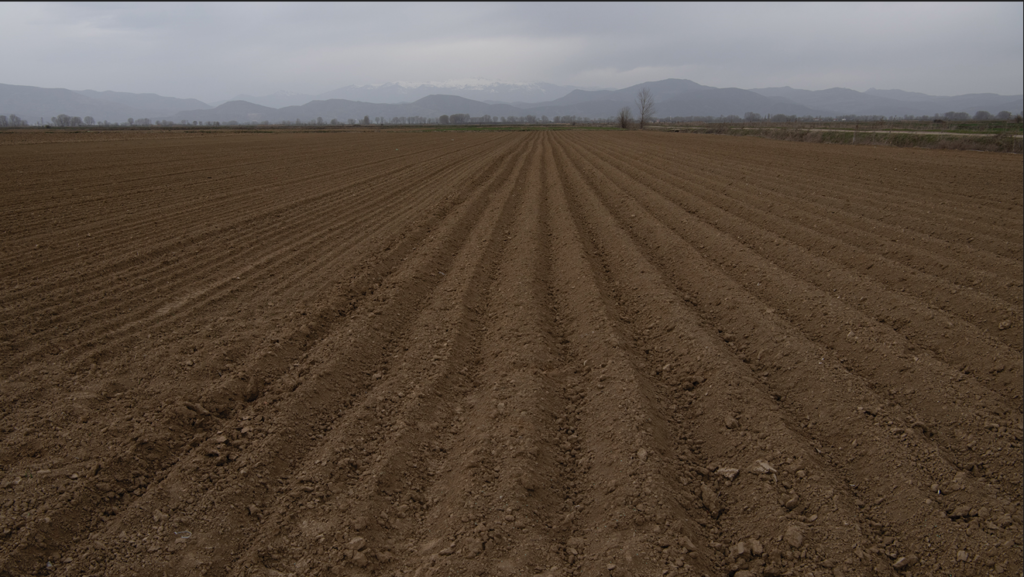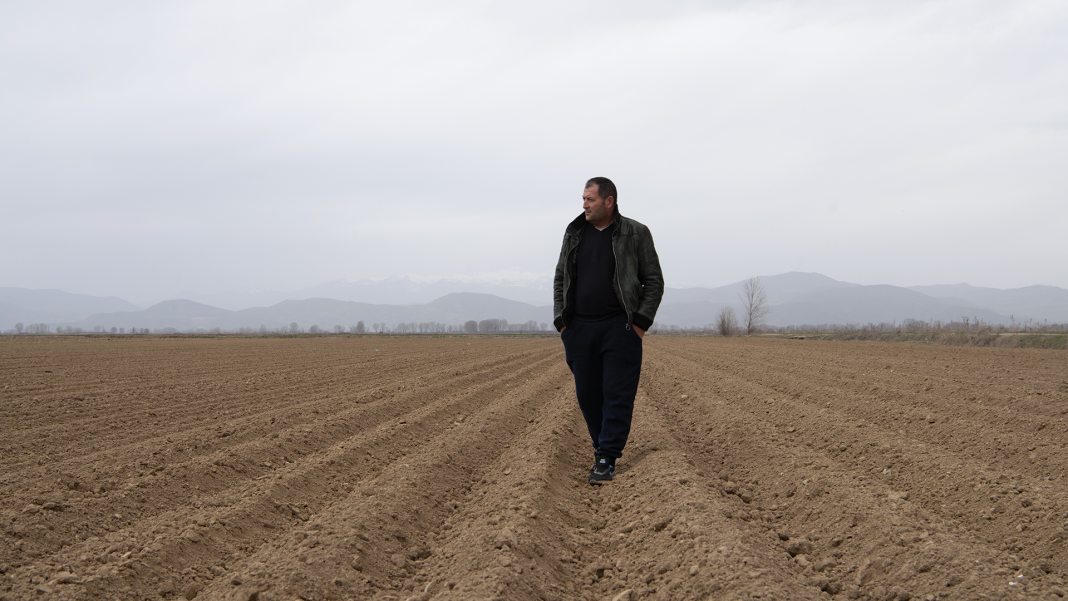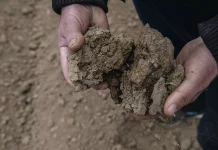Esmeralda Topi
Beans, one of the traditional foods of Albania, is disappearing from the fields due to climate change. Farmers in Korça, once the main producers, are facing huge losses, while imports from Egypt have filled the market.
For most Albanian families, Monday is ‘bean day’. A tradition passed down through generations, more enduring than any agricultural policy in the country. However, this year, the traditional warm dishes are being filled with Egyptian beans, as in Korça, once known for producing the best legumes, the crop did not survive the heat.
Altin Ibrahimi, a farmer from Pojani, who has been involved in agriculture for 20 years, recounts a disastrous year: ‘From 4 hectares, I only harvested 600 kg of beans. I used to get this amount from 2 hectares‘

Photo: Atdhe Mulla
Once an affordable dish for every household, beans have now become a luxury. Last year, its price reached 700 lek per kilogram. It is likely to remain the same this year.
‘Now we don’t know whether to plant or not, because high temperatures are expected again’, says Altini.
Due to the losses, he plans to reduce his planting by half this year.
‘I lost 10 million lek and didn’t even make 1,000 lek in profit. I have the seed, but the land is rented, and the costs for workers are high’.
Many other farmers no longer have seeds to plant. They must buy them in a market already flooded with imports.
From Korça to Cairo
Instead of harvesting in Korça, we now unload beans at the port. Data processed by Faktoje indicates that bean imports have increased more than fivefold in the last decade.
In 2014, Albania imported 1,460 tons of beans. Today? Over 7,300 tons. Why? Climate, lack of policies, and the inability to protect farmers.

Source: General Directorate of Customs
90% of the beans sold in the Albanian market have come from Egypt. Last year, Albania imported 6,788 tons of beans produced in the northeastern part of the African continent.
‘We are increasing consumption, but not production. We are importing more and more — from Africa to the Balkans‘, says Ilir Pilku, an expert on agricultural policies.

Source: General Directorate of Customs
The absence of policies and labor force
The lack of agricultural policies is the primary cause of this situation, emphasizes Professor Pilku, also pointing to the shortage of labor.
‘Beans require much more labor than any other crop. There are no policies to motivate the workforce’
Due to climate change, farmers in the southeast have experienced losses in other crops as well, such as potatoes and onions.
‘If irrigation was five times a year, this year I irrigated ten times just for potatoes. Irrigation also has its costs’, says Altini.
The regions most affected by drought and high temperatures are the South and Southeast, as well as the coastal and lowland areas, which are especially sensitive to the Mediterranean climate and the effects of global warming.

Photo: Atdhe Mulla
‘Albania faces extreme climate events almost every year, which sometimes destroy an entire year’s work’, says Esmeralda Ballesha, an expert in agriculture and rural development. ‘These events are often intense rainfall, floods, or hail’.
‘In the past 10 years, the following have been damaged: 10,000 hectares of wheat, 15,000 hectares of forage crops, 1,000 hectares of fruit trees, and more than 1,500 hectares of vineyards’, adds Ndoc Fasllia, a professor at the Agricultural University.
Rito Hamataj, a retired agronomist from the village of Kafaraj in Fier, is a recent example of the effects of hail.
‘The hail damaged 400 nectarine trees. Last year I harvested 200 quintals. This year—zero. I’ve never seen a storm like this‘, he sighs.
While farmers assess their losses, the Ministry of Agriculture has no exact figures on the damages.

Photo: Atdhe Mulla
Is there any plan?
In response to Faktoje, the Ministry of Agriculture and Rural Development mentions that it has conducted some assessments on climate impacts, primarily through foreign-funded projects. It admits that there is no annual damage assessment, but ‘it is planning measures like new techniques, resistant cultivars, and protection against hail and flooding’.
‘It’s time to properly evaluate the process of climate change, because we might see an increase in the number of businesses going bankrupt’, says Agim Rrapaj from the Albanian Agrobusiness Council.
‘If work continues without a vision, Albania will remain in the paradox of being the most agricultural country in the region while still being the largest net importer of food’, warns expert Esmeralda Ballesha.
In addition to climate challenges, Albania also faces a more dangerous factor: political decision-making. Mass emigration, minimal subsidies, suspension of IPARD funds, and a ministry that counts with its eyes instead of numbers are some of the blows being dealt to the agricultural sector.
This sector receives the least funding from the state budget. According to INSTAT, agricultural production shrank by 2.7% last year.
***
‘Agriculture is like a house without a roof’, says Altin Ibrahimi. ‘The climate burns the roof, and the policies throw the door wide open’
If the climate is burning the land, the policies are sprinkling ash on top. In a country where agriculture is part of its identity, the lack of protection for farmers is a quiet form of abandonment. Beans are just the beginning. The lingering question is: Will we protect this ‘house without a roof’, or will we continue to import everything… except responsibility?










